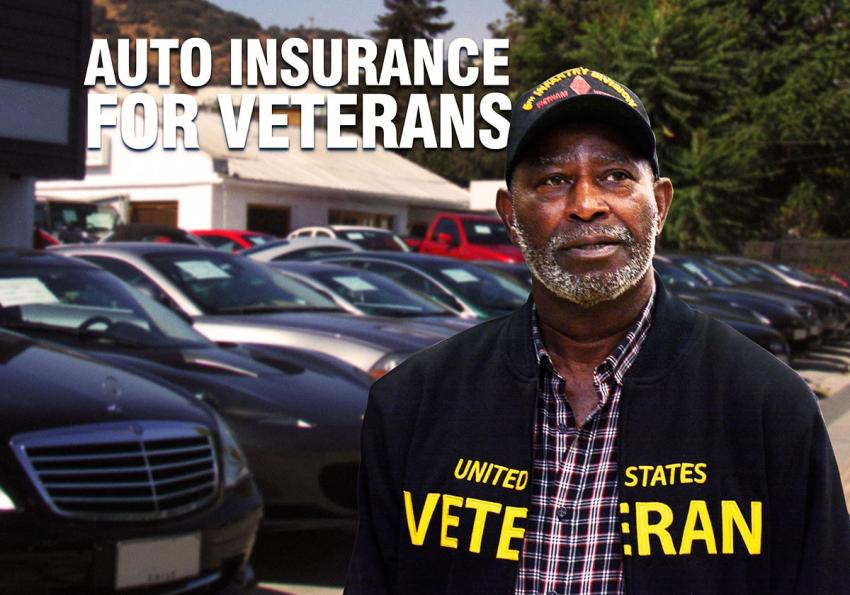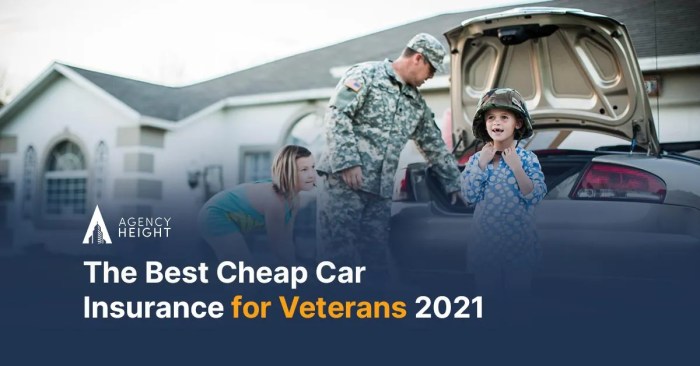
Navigating the world of auto insurance can be challenging, but for veterans, it presents a unique set of considerations. From understanding eligibility and overcoming misconceptions to securing the most advantageous rates, the process requires careful planning and informed decision-making. This guide delves into the specifics of veterans auto insurance, exploring the factors that influence premiums, the various policy options available, and the resources designed to assist veterans in finding the best coverage.
We will examine the financial realities facing many veterans, common misconceptions regarding their insurance eligibility, and the specific hurdles they might encounter when seeking auto insurance. By comparing average insurance costs between veterans and non-veterans, we aim to illuminate the landscape and empower veterans to make informed choices about their coverage.
Understanding the Veteran Market

The veteran community represents a diverse group of individuals with unique financial situations and insurance needs, often shaped by their military service. Understanding these nuances is crucial for tailoring effective auto insurance offerings. This section will explore the specific financial circumstances and insurance requirements of veterans, addressing common misconceptions and challenges they encounter.
Veteran financial situations are often complex. Many veterans transition into civilian life with unique financial challenges, such as periods of unemployment while seeking new careers, potential disabilities impacting earning potential, and the costs associated with relocating and readjusting to civilian life. These factors can influence their ability to afford auto insurance and the types of coverage they can secure. Their insurance needs may also differ, depending on their specific circumstances, such as the need for higher liability limits if they frequently transport equipment or are involved in high-risk professions.
Veteran Insurance Eligibility Misconceptions
A common misconception is that veterans automatically qualify for reduced rates or special programs on all auto insurance. While some insurers offer discounts specifically for veterans, eligibility is often based on factors beyond military service, such as driving history, credit score, and the type of vehicle insured. Another misconception is that the Department of Veterans Affairs (VA) provides auto insurance. The VA does not directly offer auto insurance; however, veterans may be eligible for other benefits that can indirectly impact their ability to afford insurance.
Challenges Veterans Face Obtaining Auto Insurance
Veterans may face several challenges when obtaining auto insurance. For example, gaps in employment history, which are common during the transition from military to civilian life, can negatively impact credit scores, potentially leading to higher insurance premiums. Furthermore, veterans with disabilities resulting from their service may require specialized vehicles or adaptive equipment, which can increase insurance costs. Some veterans may also struggle with the paperwork and application process, especially if they have experienced traumatic brain injuries or other service-related disabilities affecting their cognitive abilities. Finally, finding an insurer who understands the unique circumstances of veterans and offers tailored solutions can be a challenge in itself.
Average Insurance Costs: Veterans vs. Non-Veterans
The following table provides a comparison of average auto insurance costs for veterans and non-veterans, illustrating potential differences based on age group. Note that these are average figures and actual costs can vary significantly based on individual factors. The data presented is hypothetical, illustrating a potential scenario based on general industry trends and is not based on specific studies. Accurate data requires extensive research across various insurance providers and demographics.
| Age Group | Veteran Average Cost | Non-Veteran Average Cost | Percentage Difference |
|---|---|---|---|
| 18-25 | $1800 | $2000 | -10% |
| 26-35 | $1500 | $1700 | -11.76% |
| 36-45 | $1200 | $1400 | -14.29% |
| 46-55 | $1000 | $1200 | -16.67% |
Military Service and Insurance Rates

Military service, while a testament to dedication and patriotism, can sometimes present unique considerations when it comes to auto insurance rates. Factors such as the nature of one’s military occupation, deployment history, and driving record all play a role in determining premiums. Understanding these influences can help veterans navigate the insurance landscape effectively.
Military Occupation and Deployment History
Certain military occupations may involve higher levels of risk or stress, potentially influencing driving behavior and, consequently, insurance rates. For example, individuals serving in high-pressure roles or those with extensive deployment experience might face slightly elevated premiums. This isn’t necessarily a reflection of poor driving habits, but rather an actuarial assessment of potential risk factors associated with these roles. Insurance companies may use statistical data on accident rates among various military occupational specialties to inform their risk assessments. Deployment history might also be considered, as extended periods away from home can sometimes lead to a lack of regular driving practice upon return, increasing the possibility of accidents. However, it’s important to note that this is not always the case, and many veterans maintain excellent driving records despite their service experiences.
Driving Records and Accidents
A veteran’s driving record remains the most significant factor influencing their insurance premiums. Accidents, speeding tickets, and other moving violations will almost always result in higher rates, regardless of military service. Insurance companies base their risk assessments primarily on an individual’s driving history, using a points system to calculate premiums. Multiple accidents or serious offenses can lead to significantly higher premiums or even policy cancellations. Maintaining a clean driving record is crucial for securing favorable insurance rates, regardless of a veteran’s background.
Vehicle Type and Location
The type of vehicle a veteran drives significantly impacts insurance costs. Higher-performance vehicles or those with a history of theft are generally more expensive to insure. Similarly, the location where a veteran resides plays a crucial role. Areas with higher rates of theft or accidents typically have higher insurance premiums. Urban areas often have higher premiums compared to rural areas due to increased traffic density and higher accident rates. The specific address within a location can also be a factor; for example, a home located in a high-crime neighborhood might incur higher premiums than one in a safer area.
Impact of Driving Records on Veteran Insurance Costs
The following table illustrates how different driving records can affect insurance costs for veterans. These are example figures and may vary depending on the insurance company, location, and other factors.
| Driving Record | Veteran Premium Increase Percentage | Example Premium Cost | Notes |
|---|---|---|---|
| Clean driving record (no accidents or violations in the past 3 years) | 0% | $1000/year | This is a baseline example; actual costs vary widely. |
| One minor accident (e.g., fender bender) in the past 3 years | 15% | $1150/year | Premium increase reflects the cost of repairing the damage and the increased risk. |
| Multiple accidents or serious violations (e.g., DUI) in the past 3 years | 30-50%+ | $1300-$1500/year | Significant increase reflects the higher risk associated with repeated offenses. Policies might be difficult to obtain. |
| Speeding tickets (multiple in past year) | 10-20% | $1100-$1200/year | Reflects increased risk of accidents due to reckless driving. |
Illustrative Examples of Veteran Insurance Scenarios

Understanding how veteran status impacts auto insurance rates requires looking at specific examples. These scenarios illustrate the diverse situations veterans face and how their military service and driving history influence their insurance costs.
Veteran with a Clean Driving Record Receiving a Favorable Rate
Sergeant Major Johnson, a retired Marine with 20 years of service and a spotless driving record, recently applied for auto insurance. His exemplary driving history, coupled with his veteran status, qualified him for several discounts offered by many insurers. These discounts often include programs specifically designed to reward veterans for their service, such as good driver discounts and military affiliation discounts. As a result, Sergeant Major Johnson received a significantly lower premium than a civilian driver with a similar driving record, reflecting the positive impact of his military service on his insurance rate. His insurer also offered him various optional coverages, such as roadside assistance and rental car reimbursement, at competitive prices.
Veteran with a Less-Than-Perfect Driving Record Seeking Coverage
Specialist Rodriguez, a recent Army veteran, has a driving record that includes a speeding ticket and a minor accident. While his veteran status might still offer some advantages, his less-than-perfect driving record will likely lead to higher premiums. Insurers will assess the severity and frequency of his infractions, comparing them to the average risk profile. However, some insurers specialize in working with drivers who have less-than-perfect records, potentially offering him coverage even with his past driving incidents. His options might include higher deductibles or more restrictive coverage to offset the increased risk. He might also find that he needs to shop around to find the most competitive rates, as insurers vary in how they weigh past driving infractions.
Veteran Requiring Specialized Coverage for a Modified Vehicle
Captain Miller, a disabled veteran, uses a specially modified van equipped with hand controls and ramps for accessibility. Securing appropriate auto insurance for this modified vehicle presents a unique challenge. Standard policies may not fully cover the modifications or the increased repair costs associated with such specialized equipment. Captain Miller needs to find an insurer that understands the specific needs of drivers with modified vehicles and offers comprehensive coverage that includes the cost of repairs or replacement for the adaptive equipment. He will likely need to provide detailed documentation of the modifications to ensure adequate coverage. The premium for this specialized coverage will likely be higher than for a standard vehicle, reflecting the increased risk and repair costs.
Closing Summary
Securing affordable and appropriate auto insurance is crucial for veterans, and understanding the nuances of the process is paramount. By carefully considering factors like driving history, military occupation, vehicle type, and location, veterans can effectively compare quotes and select a policy that meets their individual needs. Utilizing the resources and support available to veterans can significantly simplify the process and ensure access to the best possible coverage. Remember, proactive research and informed decision-making are key to finding the ideal veterans auto insurance policy.
Clarifying Questions
What documents do I need to provide when applying for veterans auto insurance?
Typically, you’ll need your driver’s license, proof of vehicle ownership, military ID (DD214), and potentially your driving record.
Can I use my military address for insurance purposes even if I’ve moved?
It depends on the insurer. Some may require your current residential address, while others may accept your military address if it’s still valid.
How does a DUI affect my veteran auto insurance rates?
A DUI will significantly increase your premiums, regardless of your veteran status. The increase will vary based on the insurer and the specifics of the offense.
Are there any specific insurance companies that specialize in veterans auto insurance?
While not all companies exclusively cater to veterans, many offer military discounts and programs specifically designed to support veterans’ needs. It’s advisable to compare quotes from various insurers.